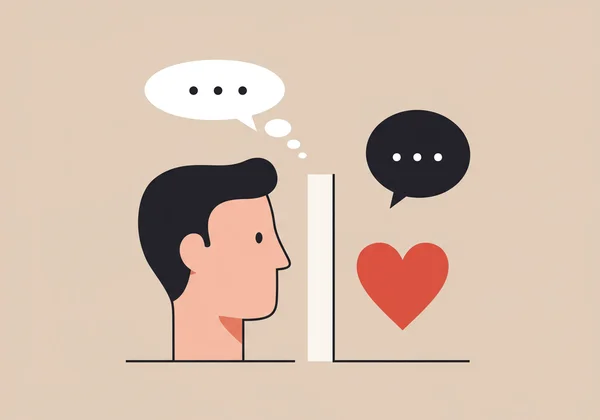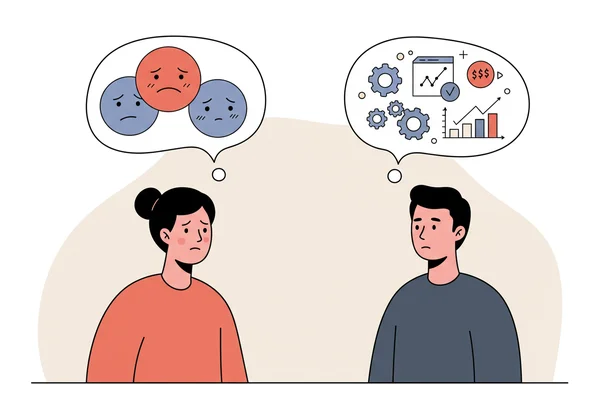Alexithymia in Daily Life: Understanding the Impact with an Online Alexithymia Test
July 21, 2025 | By Caleb Sterling
Do you often feel a disconnect between your thoughts and emotions? Or find yourself struggling to describe what you truly feel, even to those closest to you? This experience, far from being uncommon, is a core characteristic of a personality trait called alexithymia. For many, questions like why is it hard to express my feelings? can be a constant, quiet puzzle. This article explores how alexithymia manifests in daily life, shaping experiences in ways that are both subtle and significant. Understanding these signs is the first step toward clarity and a richer inner world. If you're looking to explore your feelings more deeply, you've come to the right place.
This trait is not a flaw or a disorder, but rather a different way of processing emotions. It exists on a spectrum, and gaining insight into your personal tendencies can be incredibly empowering. It provides a new language for your experiences and a roadmap for personal growth.

Recognizing the Key Signs of Alexithymia
The signs of alexithymia often hide in plain sight, mistaken for personality quirks or stoicism. They revolve around a central difficulty in connecting with one's emotional landscape. Recognizing these patterns is crucial for self-understanding. Many people go through life feeling like they're somehow different, without realizing there's a name for what they experience.
These signs are not about a lack of feeling, but rather a challenge in identifying, understanding, and verbalizing those feelings. Let's break down the most common manifestations.
Difficulty Identifying and Distinguishing Your Own Feelings
This is the cornerstone of alexithymia. It’s the internal sensation of being emotionally "muddled." You might feel a strong physical reaction—a racing heart, a knot in your stomach, tense shoulders—but struggle to label the corresponding emotion. Is it anxiety, excitement, or indigestion? This uncertainty can be frustrating, leaving you feeling disconnected from your own body and its signals.
For someone with these traits, emotional states are often perceived as a vague sense of unease or a general physical sensation rather than a specific feeling like "sadness" or "joy." This lack of a nuanced emotional vocabulary makes self-reflection a difficult task.

Challenges in Describing Emotions to Others
Even when you have a vague sense of what you're feeling, putting it into words for someone else can feel impossible. When a friend or partner asks, "How are you feeling about that?" the answer might be a simple "I don't know," "Fine," or a description of physical facts instead of emotions. This isn't a refusal to share; it's a genuine struggle to translate an internal state into language. This can make others perceive you as secretive, distant, or unemotional, which is often far from the truth.
A Focus on External Reality Over Internal States
Individuals with high alexithymia traits often have a cognitive style that is logical, pragmatic, and externally focused. They are often excellent problem-solvers, preferring to deal with concrete facts and observable events rather than abstract emotional concepts. When faced with a difficult situation, their first instinct is to analyze the practical details and find a solution, rather than explore the emotional impact on themselves or others. This is a strength in many contexts, but it can contribute to a feeling of inner emptiness or a sense of missing out on the richer, emotional side of life. A detailed alexithymia questionnaire can often highlight this thinking style.
Limited Imaginative Life and Fantasizing
Another recognized trait is a less active imagination or fantasy life. This doesn't mean a lack of creativity, but rather a tendency to think in more literal and concrete terms. Daydreaming, fantasizing about the future, or becoming deeply engrossed in fictional worlds may be less common. This ties back to the preference for external reality over internal, subjective experiences. This practical mindset is incredibly useful, but understanding its connection to emotional processing can be a key insight.
How Alexithymia Behaves in Relationships & Social Life
The challenges of identifying and describing feelings naturally extend into our most important connections. This is often where the alexithymia symptoms become most apparent and can cause the most distress, both for the individual and their loved ones. Understanding how alexithymia behaves in relationships is key to navigating them successfully.
Navigating Emotional Conversations and Conflicts
Emotional discussions and arguments can be particularly challenging. When a partner expresses a feeling, a person with high alexithymia traits might respond with a logical solution instead of emotional validation. For example, if a partner says, "I'm so stressed about work," the response might be, "You should update your resume," instead of, "That sounds really tough. I'm here for you." This isn't from a place of malice, but from a brain wired to fix problems, not just sit with feelings.

Responding to Others' Feelings and Empathy
It's a common misconception that people with alexithymia lack empathy. It's more accurate to say that expressing and acting on empathy can be different. They may possess strong cognitive empathy—the ability to intellectually understand another person's perspective—but struggle with affective empathy, which is feeling another person's emotions alongside them. They might care deeply but not know how to show it in conventional, emotionally expressive ways.
The Impact on Intimacy and Emotional Connection
Intimacy is built on shared vulnerability and emotional expression. For someone who struggles to access or describe their inner world, building this connection can be a slow process. Concerns about alexithymia and love are common. A person with alexithymia can absolutely feel deep love and attachment, but they may express it through actions—acts of service, practical support, or shared time—rather than through verbal declarations or grand emotional gestures. Recognizing these different "love languages" is vital for both partners to feel seen and valued. Taking a moment to understand your emotional patterns can provide a foundation for these conversations.
Everyday Impact: Beyond Relationships
While relationship dynamics are a major area of impact, the effects of alexithymia permeate many other aspects of alexithymia in daily life. From how you handle stress to how you make major life decisions, these underlying traits play a significant role.
Stress Responses and Physical Sensations (Somatization)
When emotions aren't identified and processed mentally, the body often takes the strain. This is known as somatization. Unexplained headaches, digestive issues, chronic pain, or fatigue can sometimes be the physical manifestation of unprocessed stress, anger, or sadness. For many, a trip to the doctor for a physical complaint is far more likely than recognizing the underlying emotional distress.
Decision-Making and Problem-Solving Styles
While a logical, fact-based approach is a great asset, it can sometimes be a challenge when making decisions that have a strong emotional component. Choosing a career path, ending a relationship, or deciding where to live are all choices that benefit from listening to your "gut feeling." When that inner emotional compass is hard to read, it can lead to indecisiveness or making choices that are practical but ultimately unfulfilling.
Self-Awareness and Personal Growth
Ultimately, the greatest impact of unexamined alexithymia is on your relationship with yourself. Self-awareness is the foundation of personal growth. Without a clear understanding of your own feelings, wants, and needs, it's difficult to set meaningful goals, build authentic self-esteem, or navigate life's challenges with resilience. Learning about this trait is not about finding a flaw; it's about gaining a crucial piece of your personal user manual. Taking a first step like getting a quick score can be an eye-opening experience.
Taking the First Step to Emotional Understanding
Recognizing yourself in the descriptions above is not a conclusion, but a beginning. Understanding alexithymia is about gaining clarity, not a label. It illuminates why you interact with the world the way you do and opens doors to new strategies for managing relationships, stress, and your own inner life. It's a path toward making exploration easier and life richer.
Ready to take that first step? The journey to self-understanding starts with a single, simple action. We encourage you to take the free alexithymia test on our website. It’s a private, reliable tool based on established psychological concepts like the OAQ-G2 to help you explore your emotional cognitive patterns. You can get an immediate summary score or opt for a unique AI Personalized Report for in-depth, actionable insights.

Frequently Asked Questions About Alexithymia's Daily Impact
What are common alexithymia symptoms? The most common signs include difficulty identifying your own feelings, challenges describing emotions to others, a focus on external events rather than internal states, and a more limited imaginative life. Physically, it can manifest as unexplained stress symptoms.
How does alexithymia affect daily interactions? In daily life, it can make emotional conversations feel awkward or difficult. It may lead to misunderstandings in relationships, as a logical or practical response might be given when an emotional one is expected. This can sometimes make a person appear distant, even if they care deeply.
Can someone with alexithymia understand love? Absolutely. People with high alexithymia traits can and do feel love, commitment, and deep attachment. The difference often lies in expression. Love may be shown through practical support, loyalty, and shared activities rather than verbal affirmations or emotional displays.
Why is it hard to express my feelings? There are many reasons this can be challenging, but for some, it is a core feature of alexithymia. It’s not about being unwilling, but about a genuine difficulty in translating complex internal sensations into words. An online alexithymia test can be a helpful starting point to explore if this trait resonates with your experience.
Is alexithymia a diagnosis? No, it is important to understand that alexithymia is not a formal mental health diagnosis in resources like the DSM-5. It is considered a personality trait or a subclinical phenomenon. Our test is an informational and self-exploration tool, not a diagnostic instrument. For any health concerns, please consult a qualified mental health professional.